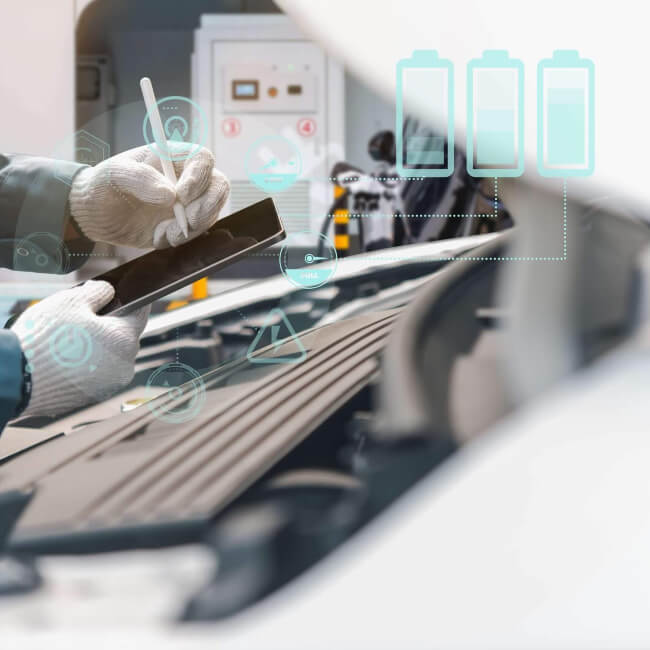-
Can't Find What You're Looking For? Start a Custom Order.
- Ford Custom Order
- CDJR Custom Order

The rising cost of oil, inflation at the grocery store, and increasing concern for the environment has led millions to purchase electric vehicles, and that market is growing stronger every day.
In addition to its lower operating costs, an electric vehicle’s recommended maintenance schedule is much lighter than that of a similarly sized gas powered vehicle. That doesn’t mean that your EV requires no maintenance, it’s just a lot different than what you’ve been used to with your gas vehicle.
Compared to gas powered vehicles, EVs have far fewer moving parts, and this makes them easier to maintain. To get the best performance from your electric vehicle, you need to give it proper care, but what does that entail? Here are some tips for you.
Tires
Electric vehicles are significantly heavier than similar sized internal combustion vehicles. Because of this, they have specially engineered tires. These tires are designed to provide less rolling resistance and to run quieter than conventional tires. However, because of the vehicle’s weight, they can wear much faster than conventional tires. Also, EVs produce instant torque as they accelerate which can also cause excess wear.
Because of these differences, EV drivers must be vigilant about keeping the air pressure in their tires at the recommended levels. Equally important is tire rotation, which should be performed at regular intervals of 8,000 mile. In addition, the tires should be replaced at 30,000 mile. Proper inflation, regular rotation, and replacement of the tires will not only give you a better ride, but the tires will last longer.
Battery Pack
The battery in your EV is the single most expensive part of the car. In fact, in many cases, it’s more prudent to trade cars than to replace a worn out EV battery pack. Given this reality, it’s important to do all you can to make it last longer.
One step you can take is to analyse your charging habits. You shouldn’t leave it plugged in for too long. Also, you shouldn’t use the quick charge feature too often. Finally, don’t let the charge get too low too often. Your best practice is to set a timer on your charging to avoid leaving it plugged in for excessive amounts of time.
Like any other vehicle, EVs are affected by the weather. Leaving your car in extreme heat or cold for extended lengths of time will cause the battery to wear out faster. If you must park outside in the winter, it’s best to park in a sunny area. In hot summer conditions, it’s best to park in the shade. Of course, parking in a climate controlled garage year round is the best practice.
The heating system in your EV works from the batteries, so you may want to give the vehicle a bit more charge to compensate for the additional load when driving in the winter months. Also, if you’re going to be driving in rainy or icy conditions a little extra charge can help to mitigate the loss of traction on wslipperypavement.
Brakes, Brake Pads, and Brake Fluid
Because of a feature called regenerative braking, an EV’s brakes will last longer than those in an internal combustion vehicle. They won’t last forever though, so plan on having your brake pads or rotors replaced when they start to wear out. Brake fluid can absorb water over time, and if the percentage of water gets too high, the water can cause rust in the system. Your mechanic can check this, and if the water exceeds 3%, the fluid should be replaced.
Alignment
Just like a traditional gas vehicle, your EV has parts in the steering and suspension systems that become out of kilter. It’s best to have your wheels aligned once or twice a year, or more frequently if you often drive on rough roads. If the wheels are out of proper alignment, the car may steer with a wobble, and the tires will wear faster.
Final Words
The maintenance items mentioned here are either peculiar to electric vehicles or deserve special attention with an EV, but don’t skimp on regularly checking over the basics. Make sure the following are in good working order on a regular basis:
- Interior and exterior lights
- Windshield wipers and fluid
- 12 volt battery connections
- Coolant levels
- Parking brake
For over 50 Years V&H Automotive has been serving Marshfield and Central Wisconsin with New Ford, Lincoln, Chrysler, Jeep, Dodge, and RAM Trucks. From Wausau to Wisconsin Rapids, or Stevens Point to Medford – we’re a short drive from anywhere for friendly service and very competitive pricing. If you have any automotive needs, check out our website or contact us at 715-387-2545. Better yet, stop in for a visit!




